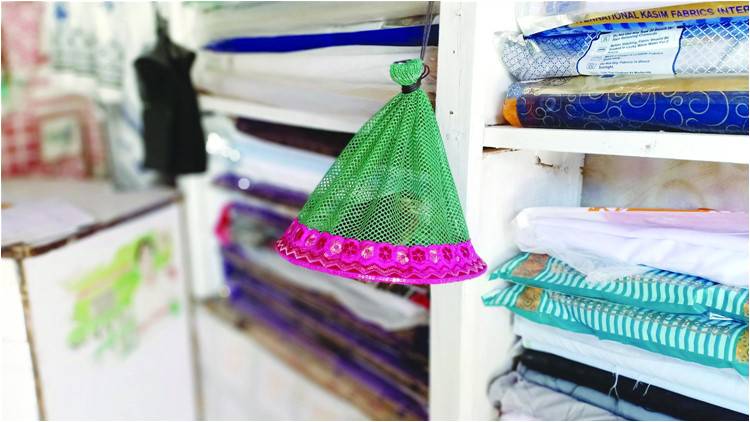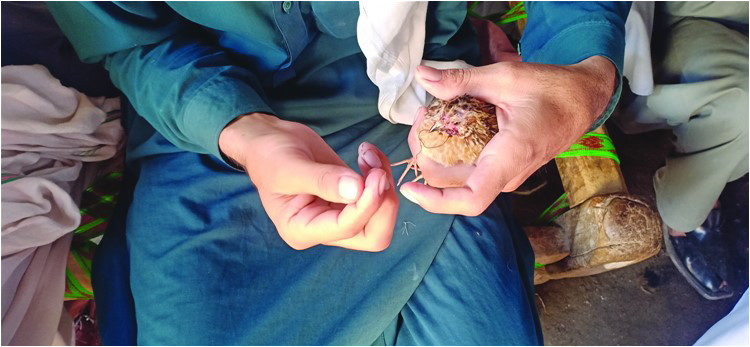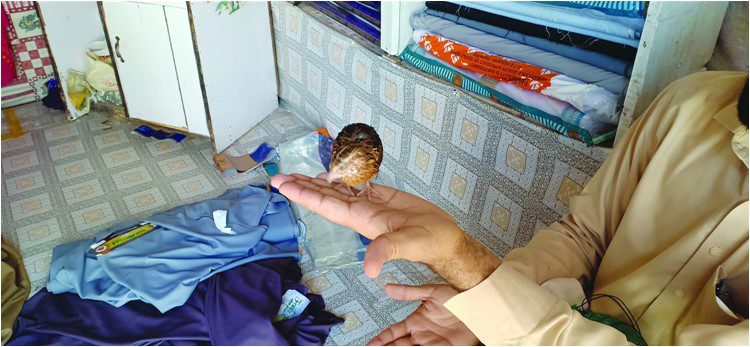
It is a bright Saturday morning in the Takht-e-Nasrati village of southern Karak district. Scores of men of all ages are flocking at a small tea-stall in the Mela, the local name for the Saturday Bazaar held every week for fruits, vegetables, meat and daily-use food items.
The men approaching the tea-stall of Fazal Khan have at least one or two Batair (quails) in their hands wrapped in microfiber cloth to protect the little birds from the outside environment. The tea-stall is the traditional favourite spot for dozens of Batair-keepers in the village and they never miss the chance for a weekly visit. For decades, they have sat here on charpoys or plastic chairs and exhibited their pet birds or arranged fights.
“The Batair-zan (local name for Batair-keepers) visit my hotel, spend their day and sometimes drink a half cup of tea,” says Fazal Khan, the stall owner who also offers Pulao and Halwa with tea.

Fazal doesn’t remember the exact dates since the Batair-keepers started sitting in his hotel but he has been watching them for more than a decade.
Batair-keeping and fights of the birds are part of a centuries-old tradition in the area. It it is also practiced in many other areas across the country. This hobby is not limited to uneducated or unemployed people. In fact, their community also includes well-dressed university graduates. There are even retired and serving government officials!
They keep the bird in their hands, take it everywhere they go and continuously give it exercise all the time within their hands to control its weight and keep the birds’ bodies hard and strong.
Interestingly, among the old Batair-zan, there are people whose hands have morphed into fist—a permanent change in their hands caused by extensive holding of the bird all the time.
80-year-old Habibullah Jan, one of the oldest Batair-keepers in the village who has spent his entire life exercising the bird in his hand, keeps his right hand closed all time. Even when he is not carrying a bird, he can be spotted jerking his empty fist though he were holding a quail. His children say that their father keeps a batair in his hand even when he is taking a nap in the noon!

The gathering is not limited only to the Saturday bazaar. They have a small makeshift hotel in the Takht-e-Nasrati bazaar known as Naqeebullah hotel where they gather every morning and spend their day arranging Batair fights and lauding the performance of their birds in previous fights. Naqeebullah hotel may be far from the cleanest hotel in the bazaar but its traditional association with the Batair-zan enthusiasts makes it a hotspot that is rarely found closed or deserted.
Seventy-five-year-old Nawab Dada says his hobby dates back to time when he just started going to school. He would wear a Qameez without a Shalwar as his parents could only afford to buy him a Qameez.
“I would take my Batair to school and at that time there was no restriction on birds from the school principal. Since then I am continuing with my hobby,” Nawab explains, once he is convinced that the interview was not intended to harm him or any of his fellow Batair-zan in the hotel.
As he starts talking, he takes out one of three birds from a small cage hanging from his knee to feed it a few grains of pearl millet.
He did not quit the hobby even when he joined the Pakistan Army and was serving in the district administration during General Zia-ul-Haq’s martial law.
“I love and care for my birds more than my children and that’s the case with every Batair-zan present here in the hotel,” he says with pride on his face.
Each Batair has to be keep separate and not allowed to see the others—a principle of the training. Nawab holds one in his right hand and the other two are in separate cages made of net and cloth. Nawab has 18 batairs in his house which are all fighters gifted by his Batair-zan friends hailing from Punjab and KP. He elder son is also seated on a chair close to him and he follows his father in keeping the birds. But he is not willing to talk to the media due to fear of the local police. The DSP of the village has imposed a ban on Batair fights as it also involves gambling. But the Batair-zan arrange the fights nevertheless, hiding from the police’s eyes.
“It’s is our tradition and we have spent our lives in it. We can’t live without it. My doctor says that I would fall sick the day I stop my hobby and stop attending the gathering,” the old man says. He adds that the police should arrest those who misuse the hobby for gambling purposes but they should not ban the centuries-old tradition which is the colour and beauty of the village. Everyone around him, with their birds in hand, nods their heads in the affirmative as Nawab talks about the police. “We never fight each other nor we have done anything that harmed anyone in the village,” says one man in the crowd. Others are less willing to talk than Nawab – the DSP visited the hotel last Saturday and told them not to arrange fights of any kind.
The training of the bird starts from the day it is captured in a hunt or purchased in a Bazaar. The food and water intake of the bird is calculated and set according to its size and weight.
“The perfect weight for a fighting batair should be kept between 75 to 90 grams depending on the size,” says Jahan Shah, another senior Batair-zan who has been keeping the birds since his childhood. Now he is a retired government servant.
“You have to keep the weight intact in the proper bracket. That constant weight can only be kept when you take care of its food and water intake proportions along with the duration of exercise,” Jahan explains, adding that a few extra grains of pearl millet makes the bird overweight and then it needs more exercise to shed that weight.
“I can feel my batair’s weight in my hand but we have an electrical balance to measure the exact weight. Every batair-zan has to feed his bird as per the exercise that he gives to the bird in a day.”
The training also includes temperature maintenance – protecting the bird from heat and cold. For doing that they keep small net cages in summer and in winter they wrap the cage in a warm cloth. A Batair often encounters flu or indigestion. To cure this, the young Batair-zan consults his seniors for treatment.
According to Jahan, the birds’ price starts from Rs 50 and reaches up to half a million depending on the history of its victories in the fights. He himself owns a Batair for which he has rejected an offer of Rs 85,000. “To my knowledge some batair have been sold for up to half a million rupees and a person in the town has recently purchased a batair in Bannu at Rs 250,000 in partnership with another batair-zan. They have hired a trainer to keep its body in shape and strong,” he says. He says that a batair-zan in Bannu had even sacrificed a buffalo in sadqa when his batair got sick. He added that one elder in his family had made an announcement that he would stop talking to anyone in the family who did not come to condole the death of his precious batair!
Wild quails suitable for this hobby are captured using a wide variety of methods, including attracting them using recorded bird calls.
These batair-zan visit Panjab and Sindh for hunting in different seasons and also visit other districts and provinces for watching fights. People from other districts of KP come to Karak for watching fights, too, depending upon the value and fight history of the birds brought to the field.
A plan cotton cloth is spread on the ground and the spectators gather around the cloth to watch the fight. A few among them hold another white cloth over the head of the viewers in the circle so that the losing Batair might not flee.
The Batair-zan never bring the bird to the ground for fight before “Mail” — a term for the morning dropping of the bird which is green in colour. Without Mail, the Batair is heavy and can’t give its best performance in a fight.
Experts sharpen the birds’ beaks with a razor and some people feed the birds narcotics so that they do not feel pain in the fight. The gamblers starts shouting and announcing their bets during the fight and in majority of these, the batair owners give the loosing bird to the winner.
The men approaching the tea-stall of Fazal Khan have at least one or two Batair (quails) in their hands wrapped in microfiber cloth to protect the little birds from the outside environment. The tea-stall is the traditional favourite spot for dozens of Batair-keepers in the village and they never miss the chance for a weekly visit. For decades, they have sat here on charpoys or plastic chairs and exhibited their pet birds or arranged fights.
“The Batair-zan (local name for Batair-keepers) visit my hotel, spend their day and sometimes drink a half cup of tea,” says Fazal Khan, the stall owner who also offers Pulao and Halwa with tea.

Fazal doesn’t remember the exact dates since the Batair-keepers started sitting in his hotel but he has been watching them for more than a decade.
Batair-keeping and fights of the birds are part of a centuries-old tradition in the area. It it is also practiced in many other areas across the country. This hobby is not limited to uneducated or unemployed people. In fact, their community also includes well-dressed university graduates. There are even retired and serving government officials!
They keep the bird in their hands, take it everywhere they go and continuously give it exercise all the time within their hands to control its weight and keep the birds’ bodies hard and strong.
Interestingly, among the old Batair-zan, there are people whose hands have morphed into fist—a permanent change in their hands caused by extensive holding of the bird all the time.
80-year-old Habibullah Jan, one of the oldest Batair-keepers in the village who has spent his entire life exercising the bird in his hand, keeps his right hand closed all time. Even when he is not carrying a bird, he can be spotted jerking his empty fist though he were holding a quail. His children say that their father keeps a batair in his hand even when he is taking a nap in the noon!

The gathering is not limited only to the Saturday bazaar. They have a small makeshift hotel in the Takht-e-Nasrati bazaar known as Naqeebullah hotel where they gather every morning and spend their day arranging Batair fights and lauding the performance of their birds in previous fights. Naqeebullah hotel may be far from the cleanest hotel in the bazaar but its traditional association with the Batair-zan enthusiasts makes it a hotspot that is rarely found closed or deserted.
Seventy-five-year-old Nawab Dada says his hobby dates back to time when he just started going to school. He would wear a Qameez without a Shalwar as his parents could only afford to buy him a Qameez.
“I would take my Batair to school and at that time there was no restriction on birds from the school principal. Since then I am continuing with my hobby,” Nawab explains, once he is convinced that the interview was not intended to harm him or any of his fellow Batair-zan in the hotel.
As he starts talking, he takes out one of three birds from a small cage hanging from his knee to feed it a few grains of pearl millet.
He did not quit the hobby even when he joined the Pakistan Army and was serving in the district administration during General Zia-ul-Haq’s martial law.
“I love and care for my birds more than my children and that’s the case with every Batair-zan present here in the hotel,” he says with pride on his face.
Each Batair has to be keep separate and not allowed to see the others—a principle of the training. Nawab holds one in his right hand and the other two are in separate cages made of net and cloth. Nawab has 18 batairs in his house which are all fighters gifted by his Batair-zan friends hailing from Punjab and KP. He elder son is also seated on a chair close to him and he follows his father in keeping the birds. But he is not willing to talk to the media due to fear of the local police. The DSP of the village has imposed a ban on Batair fights as it also involves gambling. But the Batair-zan arrange the fights nevertheless, hiding from the police’s eyes.
“It’s is our tradition and we have spent our lives in it. We can’t live without it. My doctor says that I would fall sick the day I stop my hobby and stop attending the gathering,” the old man says. He adds that the police should arrest those who misuse the hobby for gambling purposes but they should not ban the centuries-old tradition which is the colour and beauty of the village. Everyone around him, with their birds in hand, nods their heads in the affirmative as Nawab talks about the police. “We never fight each other nor we have done anything that harmed anyone in the village,” says one man in the crowd. Others are less willing to talk than Nawab – the DSP visited the hotel last Saturday and told them not to arrange fights of any kind.
The training of the bird starts from the day it is captured in a hunt or purchased in a Bazaar. The food and water intake of the bird is calculated and set according to its size and weight.
“The perfect weight for a fighting batair should be kept between 75 to 90 grams depending on the size,” says Jahan Shah, another senior Batair-zan who has been keeping the birds since his childhood. Now he is a retired government servant.
“You have to keep the weight intact in the proper bracket. That constant weight can only be kept when you take care of its food and water intake proportions along with the duration of exercise,” Jahan explains, adding that a few extra grains of pearl millet makes the bird overweight and then it needs more exercise to shed that weight.
“I can feel my batair’s weight in my hand but we have an electrical balance to measure the exact weight. Every batair-zan has to feed his bird as per the exercise that he gives to the bird in a day.”
The training also includes temperature maintenance – protecting the bird from heat and cold. For doing that they keep small net cages in summer and in winter they wrap the cage in a warm cloth. A Batair often encounters flu or indigestion. To cure this, the young Batair-zan consults his seniors for treatment.
According to Jahan, the birds’ price starts from Rs 50 and reaches up to half a million depending on the history of its victories in the fights. He himself owns a Batair for which he has rejected an offer of Rs 85,000. “To my knowledge some batair have been sold for up to half a million rupees and a person in the town has recently purchased a batair in Bannu at Rs 250,000 in partnership with another batair-zan. They have hired a trainer to keep its body in shape and strong,” he says. He says that a batair-zan in Bannu had even sacrificed a buffalo in sadqa when his batair got sick. He added that one elder in his family had made an announcement that he would stop talking to anyone in the family who did not come to condole the death of his precious batair!
Wild quails suitable for this hobby are captured using a wide variety of methods, including attracting them using recorded bird calls.
These batair-zan visit Panjab and Sindh for hunting in different seasons and also visit other districts and provinces for watching fights. People from other districts of KP come to Karak for watching fights, too, depending upon the value and fight history of the birds brought to the field.
A plan cotton cloth is spread on the ground and the spectators gather around the cloth to watch the fight. A few among them hold another white cloth over the head of the viewers in the circle so that the losing Batair might not flee.
The Batair-zan never bring the bird to the ground for fight before “Mail” — a term for the morning dropping of the bird which is green in colour. Without Mail, the Batair is heavy and can’t give its best performance in a fight.
Experts sharpen the birds’ beaks with a razor and some people feed the birds narcotics so that they do not feel pain in the fight. The gamblers starts shouting and announcing their bets during the fight and in majority of these, the batair owners give the loosing bird to the winner.

